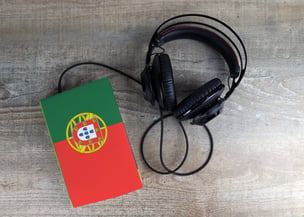 Are you Ready to Learn European Portuguese this Year?
Are you Ready to Learn European Portuguese this Year?
With a new year comes newfound motivation and ambitions. Many are looking for a kickstart to their language-learning goals, but diving right into European Portuguese can be overwhelming.
As a beginner, maybe you’ll buy a grammar book, bookmark a few websites, look up some basic phrases, or maybe even plan a trip to Portugal. Before too long, your initial excitement is replaced by confusion when you realize just how much there is to learn. It’s hard to take the first steps when all you really want to do is just speak the language already! So what’s the easiest way to start learning European Portuguese?
Well, there’s no avoiding some of the confusion, but there are plenty of strategies to simplify your approach as you begin the journey. After that, it’s all about allowing your momentum to carry you forward.
Resources
First of all, consider the types of resources you’re using. There are two primary dialects: 🇧🇷Brazilian Portuguese and 🇵🇹European Portuguese. It’s much easier to find Brazilian resources, but taking the extra effort to seek out resources specific to European Portuguese will save you time, energy and lots of frustration in the long run.
Native speakers can understand both variants, but there are significant differences in grammar, vocabulary, expressing formality, and most notably, pronunciation. For beginners who want to learn the way Portuguese is spoken in Portugal, it can add an extra layer of complexity if what you’re studying doesn’t match what you hear.

Next, you’ll want to decide whether to start by studying on your own, taking an online course, taking group classes, or hiring a personal tutor. This will depend on your preferences and budget. Online courses and books are a more affordable way to start and will help you establish some of the basics before adding on other types of learning methods. That said, everybody learns differently and it’s okay, and encouraged, to learn from multiple sources.
Regardless of what you choose, we think it’s good to have the right balance of structure and exploration. A series of lessons helps you stay focused and avoid some of the planning involved in deciding what to study next, but it’s also important to hear what real conversations sound like and take opportunities to use the language in your own way out in the real world.
Before you Begin…
Before you begin studying, remember to be patient with yourself. Keep an open mind and don’t worry about understanding every detail yet. At this stage, you just want to allow yourself to explore and develop a general foundation for the language.
Getting By

Even if it’s just saying Boa tardeGood afternoon or ObrigadaThank you(female speaker) or making a simple comment, be sure to practice speaking as early as possible. If you let yourself hide until you’re perfectly fluent, you’re never going to get perfectly fluent!
Start by focusing on what will help you “get by”, starting with some short phrases that make you sound polite and respectful. Since you’re just getting started with learning European Portuguese, this is the easiest way to lay the foundation for effective communication, even when you don’t have all the words you need yet.
Learn how to say “please”, “thank you”, “excuse me”, and other simple comments and questions. Think about what you do on a daily basis and seek out a few vocabulary words you need for your own circumstances. At this stage, it may feel more like memorizing than learning, but having a few “go-to” phrases is important for building your confidence and setting you up for the conversations that will make learning happen more naturally in the future.
Get a “Taste” of the Basics
Now you’ll want to introduce yourself to grammar with definite and indefinite articles (the words for “the” and “a”), basic pronouns (I, you, they, etc), basic conjunctions (or, and, but, etc.), and a few common verbs. Also take note of the concept of gender in Portuguese words, especially if you’ve never studied a Romance language. Start learning more basic vocabulary for things like food and everyday objects.
Open Your Ears
At the same time, begin listening to Portuguese regularly to develop an awareness of the sounds of the language. Try to repeat what you hear on television, in podcasts, or from conversations. You won’t understand everything or have perfect pronunciation yet, but the more you hear the language spoken by native speakers, the more your brain starts to understand the patterns. Pay attention to the written word, too. Notice how a single letter often corresponds to many different sounds. In Portuguese, this is especially true with the vowels, as well as the letters “s” and “r”.
Shortcuts to Avoid Conjugating Verbs
After you’ve had some fun exploring useful phrases and basic grammar, it’s time to take a closer look at verbs. Each Portuguese verb can have more than 50 different forms across various tenses and moods. That’s enough to make a beginner’s head explode! Luckily, you can start by focusing on just a few tenses that will get you through the most common situations.
Talking About the Present (and the Future!)
Start by learning the indicative present tense (presente do indicativo), as this will actually allow you to talk about the present, present continuous, present perfect continuous, and the future, if you know a few tricks…
For example, if you know the present tense conjugations of irto go , you can use those along with the infinitive form of a verb to say that you are going to do something (i.e. to refer to what you’re doing in the near future):
Vou aprender portuguêsI am going to learn Portuguese Vamos falar portuguêsWe are going to speak Portuguese Vais estudar?Are you(inf., sing.) going to study?Start with some of the most common verbs such as:
- serto be(permanent) estarto be(temporary)
- irto go terto have poderto be able to (can, may)
- gostarto like falarto speak comerto eat
Many of the common verbs happen to be irregular, but also be sure to cover the the regular present tense endings for -ar verbs, -er verbs, and -ir verbs. That way, you can apply the typical patterns when you come across new verbs.
Talking About the Past
Next, focus on the simple past tense (pretérito perfeito) so you can talk about things that already happened. Again, start with some of those common verbs mentioned above, as well as the regular simple past tense endings for -ar verbs, -er verbs, and -ir verbs.
Gostei de aprender portuguêsI liked learning PortugueseIt’s also useful to know how to talk about the past using the verb haver.
You should at least familiarize yourself with the past continuous tense (pretérito imperfeito – imperfect past). Learning just a few verbs from what is sometimes called the “courtesy imperfect” can help you make your requests sound more polite:
Podíamos falar consigo?Could we speak with you? Queria um café, por favorI would like a coffee, pleaseJust like saying “I would like” instead of “I want”, using queria makes your request sound less direct and demanding.
>>>Checkout this blog post for more shortcuts like these: Shortcuts for Learning European Portuguese
Then What?
Bom trabalho!Good work! You’re off to a great start, but now let’s talk about how to make sure that this start doesn’t lead to a dead end.
Stick With It

As you continue learning, staying consistent is essential. Find study methods that you can realistically stick to over the long term.
If you do at least a little bit every day, Portuguese starts to become a bigger part of your life. Even if you can’t give much of your time, it’s much more important to connect with the language regularly, rather than ignoring it for a while and then doing a marathon study session.
The easiest way to start learning European Portuguese is to find sustainable habits that give your brain the repeated, frequent exposure it needs. This makes the learning process more efficient and less stressful, so you can keep your skills fresh without having to repeatedly backtrack.
Maintaining consistency shouldn’t feel like a drag, so don’t forget to allow yourself to enjoy learning! Not every interaction with the language has to be goal-oriented. For example, you could listen to European Portuguese music, watch television shows in Portuguese, enjoy films in Portuguese, or look up Portuguese recipes. Even if you don’t understand everything at first, you’ll be getting exposure to the language and culture, as well as developing your curiosity.
Learn to Adapt
Now that you know a little bit more, take a step back to see what other go-to phrases you can add to help yourself manage simple conversations. Learn some phrases that will help you ask for clarification or repetition, so that you can handle the inevitable confusion, or just to buy you some time! You can start out by beginning conversations in Portuguese and asking if it’s possible to switch to English if necessary. Notice where you get stuck and use that to guide what topics or grammar you should focus on learning next.
Make it Relevant to You
Most importantly, stay motivated by thinking about your own personal goals related to learning Portuguese. What should you learn first to impact your life the most? Maybe you don’t need to know how to have an intelligent conversation about politics just yet, but it sure would help if you could talk about what time it is or order at a restaurant! The easiest way to get started learning European Portuguese is to simply start where you are and get comfortable using your struggles as opportunities to learn.
It’s helpful to think of learning as more of a cycle like this: beginning with the basics that will help you get by and over time going back to review and gradually expand upon your knowledge. It’s not a race to get to the fluency finish line! Instead, try seeing language learning as an opportunity for continual growth and exploration.
Get Started!
Consider joining PracticePortuguese to give you the resources and support you need to start learning European Portuguese this year. If you want to reflect on your own personal goals and explore some learning strategies, check out more tips in this article on creating your own study plan: Learn European Portuguese This Year
Feliz Ano Novo!Happy New Year!



Hi there,
Curious, what book would you recommend to start? I speak French and Italian at an Intermediate Level and like to start out learning languages by writing down the verb conjugations; etc.. before I being practicing via a podcast or tutorial like your site. I’m a visual learning and like seeing the word in my head when I listen, which will be my next step.
I couldn’t find Aprender Portugues, Vol. 1 in the States. Well, it was $75 so perhaps it was discontinued.
Practice Makes Perfect?
Or, do you have a book?
Thanks so much…
Looking forward to your site. 😉
Sincerely,
Michelle
Olá, Michelle! Maybe this forum topic can help: Practice Portuguese Forum – Best Portuguese Textbooks. There are no Practice Portuguese books at the moment! 🙂
I found the article most interesting . It encourages me to continue and to switch from Brazil Portuguese which does not help me for my trip to Portugal.
I too am a visual earner. I’d like an app on my phone but need it to be eu portuguese, definitely not Brazilian. Is there one? The ones i’ve looked at all seem to be Brazilian – understandable commercially, but not appropriate for use in Portugal.
Our app is specifically for learners of European Portuguese, not Brazilian. You can find it in the App Store / Play Store by searching Practice Portuguese and looking for our mascot (the rooster). If you’re already a member via our website, you can use the same email and password to log in to the app without paying extra.